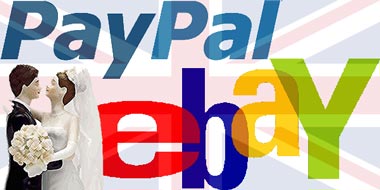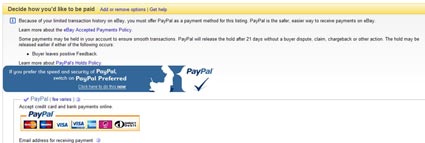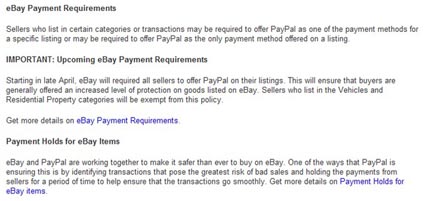A friend and fellow collector in the UK sent me some information he encountered in listing items for sale on eBay (ebay.co.uk), that reveal more policy changes unfolding in regards to further PayPal integration with the auction service. This is related to an article published last week about “PayPal Only” developments in Australia (see ““PayPal Only” eBay Developments In The News“).
While the news in the last article was related to eBay announcements that (beginning mid-June) PayPal would be the only method of payment permitted on eBay transactions taking place in Australia (ebay.com.au), this new development in the UK involves a mandate that sellers offer PayPal as one of the payment options or, in some cases, the only payment option. More, in some circumstances, PayPal may hold the payment on behalf of the seller in their account until a predetermined amount of time has passed or the buyer leaves positive feedback for the transaction.
These are screen captures from the UK eBay user that were shared with me:
Full Resolution: eBay UK Screencapture 01
This section states:
Decide how you’d like to be paid
Because of your limited transaction history in eBay, you must offer PayPal as a payment method for this listing. PayPal is the safer, easier way to receive payments on eBay.
Learn more about the eBay Accepted Payments Policy.
Some payments may be held in your account to ensure smooth transactions. PayPal will release the hold after 21 days without a buyer dispute, claim, chargeback or other action. The hold may be released earlier if either of the following occurs:
- Buyer leaves Positive Feedback.
Learn more about PayPal’s Holds Policy.
Full Resolution: eBay UK Screencapture 02
This section states:
eBay Payment Requirements
Sellers who list in certain categories or transactions may be required to offer PayPal as one of the payment methods for a specific listing or may be required to offer PayPal as the only payment method offered on a listing.
IMPORTANT: Upcoming eBay Payment Requirements
Starting in late April, eBay will required all sellers to offer PayPal on their listings. This will ensure that buyers are generally offered an increased level of protection on goods listed on eBay. Sellers who list in the Vehicles and Residential Properties categories will be exempt from this policy.
Get more details on eBay Payment Requirements.
Payment Holds for eBay Items
eBay and PayPal are working together to make it safer than ever to buy on eBay. One of the ways that PayPal is ensuring this is by identifying transactions that pose the greatest risk of bad sales and holding the payments from sellers for a period of time to help ensure that the transactions go smoothly. Get more details on Payment Holds for eBay items.
I’m sure there are many reasons for these continuing developments with PayPal becoming more integrated with eBay – more profits for both companies, less risk for PayPal with users filing credit card charge backs, as well as some more control over eBay transactions in order to better protect customers from fraud.
Having said that, while I applaud any efforts on eBay and PayPal’s parts to make for safer trading, in my own personal experience, there are larger issues that are not in any way addressed by refining payment options and processes. As a for instance, being able to speak to someone on the phone, from either company, that is enabled to act on information, rather than typically instructing the customer to wait out slow, internal processes that do not seem to factor in details that do not fit within the finite fields of information that they deem relevant.
Another issue I’ve encountered is that eBay could be much more proactive in combating fraud before it happens, rather than waiting for a customer to be victimized and then file a complaint through their traditional reporting channels.
There are sound eBay policies currently in place which cannot currently be reported by non-victims using the online eBay reporting interfaces, should a member of the eBay community encounter such violations and attempt to report them.
It is interesting that some of these changes are being implemented outside of the U.S. (such as the UK and Australia),; I do not know if this is a phased approach, territory to territory, or if different banking and other regulations are leading to different policies.
Jason De Bord



